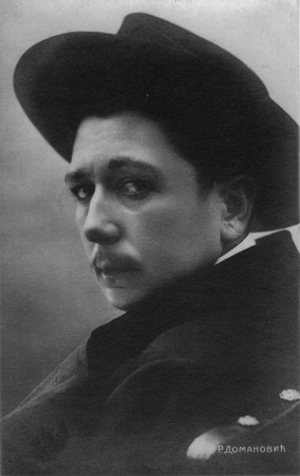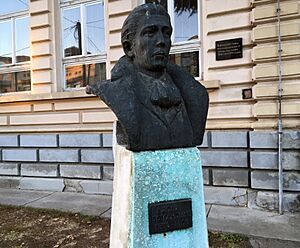Radoje Domanović facts for kids
Quick facts for kids
Radoje Domanović
|
|
|---|---|
 |
|
| Born | 16 February 1873 Ovsište, Principality of Serbia |
| Died | 17 August 1908 (aged 35) Belgrade, Kingdom of Serbia |
| Occupation | writer, teacher, journalist |
| Nationality | Serbian |
| Period | 1893–1903 |
| Literary movement | Realism |
| Notable works | Stradija, The Leader, Danga (Stigma) |
Radoje Domanović (born February 16, 1873 – died August 17, 1908) was a Serbian writer, teacher, and journalist. He is best known for his funny and clever stories that made fun of society and politics. These types of stories are called satirical short stories. Radoje spent many of his adult years battling a serious illness called tuberculosis. Even though he was sick, he was a powerful writer who criticized the problems in Serbian society at the time.
Contents
About Radoje Domanović
Domanović was born in a village called Ovsište in Topola. He went to a high school (called a gymnasium) in Kragujevac. Some of his teachers were arrested for protesting the government.
From 1890 to 1894, Domanović studied history and philology (the study of language and literature) at Belgrade's Grande École. He shared some of his first writings with a student group. Domanović was one of the first writers to describe city life in his stories. This style of writing became known as "Belgrade prose."
Domanović is seen as the best satirist in Serbian literature around the year 1900. He was a talented writer who cared about politics. He used his sharp writing to speak out against unfairness in the new democracy.
Early Life and Career
In 1893, Domanović wrote his first story, Na mesečini (In the Moonlight). It was published in a popular magazine. Two years later, he became a teacher at a high school in Pirot. There, he met Jaša Prodanović, who later helped start a political party.
At that time, Domanović joined The Republican Party. He also married Natalija Ristić. He actively supported the idea of a republic (a country led by elected officials) even though Serbia was a monarchy (led by a king). He was often warned not to criticize the government.
As a punishment for his political views, he was moved to different schools. After nine months in Pirot, he was sent to Vranje. A year later, he was moved again to Leskovac. In 1898, he gave a speech criticizing how teachers were treated. Because of this, he and his wife were fired from their jobs. In response, he wrote a story called Ukidanje strasti (The Tearing of Passion).
Later Years and Legacy
In 1899, Domanović published two collections of short stories. One of his famous stories, Danga, came out that year. The next year, he got a good government job as a clerk.
In 1902, after he published Stradija, he was fired again. In this story, Domanović showed how police stopped people from voting freely. He also showed how government ministers often changed jobs. Domanović then started writing for a magazine called Odjek (Echo).
After a big change in government in 1903, Domanović got his job back. He also received money to work on his stories. It was said that the new government saved his life, as he was on a list of people the old government wanted to get rid of. In 1904, he started his own magazine called Stradija, which had 35 issues. The next year, he joined the State Press corps.
Radoje Domanović died in 1908 from tuberculosis. He was only 35 years old. He left behind his wife, his son Zoran, and his daughter Danica.
Famous Short Stories
Domanović was one of the first writers to describe city life in his new works. This style became known as "Beogradska proza" (Belgrade prose). In these stories, the city of Belgrade was not just a background, but almost like a character itself.
Domanović was very good at writing sharp satire. His stories often showed a pessimistic or bleak view of society. He lived for only 35 years and did not publish a lot. However, in his short life, he planned many stories to show the problems in society.
Here are some of his most famous stories:
- Stradija (Land of Tribulation): This is a story that uses symbols to criticize how harsh leaders can be and how people often obey them too easily.
- Danga (The Stigma): In this story, the author dreams of visiting a country where everyone blindly follows their leaders. All the people are branded on their foreheads without complaining. The story ends when the narrator, as a Serb, says he is braver and asks to be branded ten times.
- Ukidanje strasti (Abolishing Passion): This is a funny story about a law that made people stop feeling strong emotions. After this law, people stopped doing things like smoking, drinking, or taking part in politics.
- Razmišljanje jednog običnog srpskog vola (Reasoning of an Ordinary Serbian Ox): This story criticizes how Serbs sometimes misuse their history and traditions. It also points out unfair behavior from the point of view of an ox. The ox starts thinking clearly because of the pain and sadness he feels from seeing his master's dishonest actions.
- Kraljević Marko po drugi put među Srbima (Kraljević Marko Among the Serbs For the Second Time): This story is about a legendary Serbian hero who returns. It talks about false promises for a better future.
- Mrtvo more (Dead Sea): This story is about how people often resist any kind of progress or new ideas.
- Vođa (The Leader): This story is about a leader who wasn't good at his job. People chose someone they had never seen to lead them to a better place. After a long, difficult journey, they realized their leader was blind. This story was a criticism of Nikola Pašić, a political leader, after Domanović became unhappy with his actions.
Radoje Domanović's Legacy
Many schools and libraries in Serbia are named after Radoje Domanović. The "Radoje Domanović" foundation gives an award for satirical works and for helping Serbian satire.
The "Radoje Domanović" Project started in 2013. Its goal is to put all of Domanović's works online. This helps more readers around the world access his stories, especially through translations.
 | Jewel Prestage |
 | Ella Baker |
 | Fannie Lou Hamer |


